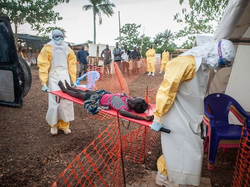*UPDATE: This article was written on August 27, 2014. As of October 3, 2014, the CDC estimates the number of people that have died from contracting ebola in the current outbreak has increased to 3,439, and the number of people sickened by ebola (as measured by laboratory confirmed cases) has increased to 4,108. Additionally, the countries now affected, including travel-related illnesses, are: Guinea, Liberia, Sierra Leone, Nigeria, Senegal, and the United States.
The Ebola virus is still raging on in West Africa, and showing no signs of slowing down. The current outbreak, which began in Guinea, has viciously spread to Liberia, Sierra Leone, and Nigeria. To date, it has killed an estimate of 1,427 people and sickened over 2,600. While this outbreak has had nowhere near the effect of other viruses such as AIDS or the flu, epidemics such as Ebola force affected countries and the world to face some serious facts about culture, health care, and our ever-evolving global society.
There has been aspirational talk from the World Health Organization (“WHO”) and other non-governmental organizations in helping the affected areas. Furthermore, multiple countries, including the United States, have pledged increased aid to Ebola-stricken countries. With any relatively unknown disease, however, support and aid has been slow to come. According to some, for example, the United States did not take the current epidemic seriously until two American aid workers contracted Ebola in Liberia. Furthermore, although efforts to develop an Ebola vaccine are underway, major pharmaceutical companies believe there is little profit in developing one. The virus has such a high mortality rate that researchers, in past outbreaks, have not deemed it necessary to create a vaccine, as the virus typically burned itself out in a short period of time. The lack of research and funding may also be due to the fact that Ebola has yet to show itself in a developed country.
Research and aid problems aside, the Ebola epidemic brings to the forefront many issues that have been known for years, but have been too difficult to address. Ebola has all but decimated West African cultural traditions and practices, or is at least on track to. Funeral practices in affected countries, for example, have been deemed one of the main factors leading to Ebola’s spread throughout the West African region. These practices involve “washing the body before it is buried,” meaning that relatives often come into contact with infected bodily fluids via the deceased, and further spread the disease. The WHO now recommends that well-trained personnel conduct funerals and burials and dispose diseased remains “in accordance with recognized international biosafety provisions,” much to the expected chagrin of family members.

Image Source: ABC News
West African countries’ health care systems are also inadequate, and suffer from suspicion and stereotypes. Years of civil war and political strife all but destroyed most of these countries’ health case infrastructure. Moreover, this is the first time West Africa has experienced an Ebola outbreak, meaning that doctors and health personnel are highly untrained. For example, in Sierra Leone, there is only one laboratory even capable of testing for Ebola, which greatly slows response and awareness. The volunteers and non-governmental organizations haven’t fared much better in their attempts to bolster the failing health care; reports of attacks against Ebola isolation clinics due to fear and misinformation are widespread. Government response has also been severely lacking, or ineffective. Liberia has resorted to quarantine and curfew measures after a largely inadequate response by President Ellen Johnson Sirleaf’s government. This has prompted riots, food shortages, and even attacks on Ebola isolation centers.
Perhaps the most important consideration is that Ebola is not simply an African problem; it is an international one. Although some would consider headlines stating “Ebola only a plane ride away” to be fear mongering, this does not take away from their truth. Ignorance and lack of initiative have led to the spread of once unknown viruses before; think of AIDS, for example. North Americans once considered this simply an “African” disease. The ramifications of that rationale are still evident today. Thus, although infrastructures in developed countries are substantially more likely to deal with Ebola cases, it is in the international community’s best to help West African countries, and other developing nations, develop stronger health-care infrastructure and better responses to epidemics. Commentators correctly point out that “there are other diseases besides Ebola that can very quickly turn into a pandemic if they aren’t extinguished early enough.” Thus, providing aid and guidance now could have a big impact on the international community in the future.
Bailey Woods is a 4L law student at the University of Denver Sturm College of Law and Candidacy Editor for the Denver Journal of International Law & Policy.

